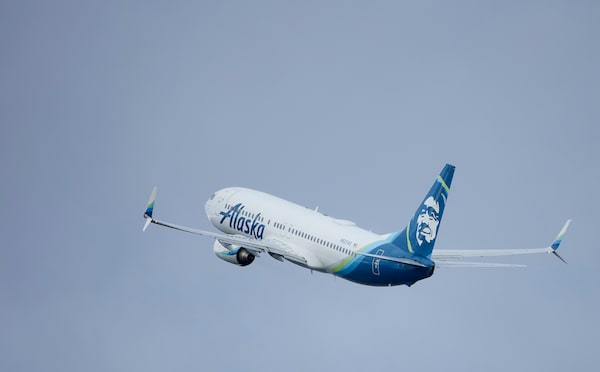
Alaska Airlines flight 794, a Boeing 737-800, takes off from Portland International Airport in Portland, Ore., Jan. 6.Craig Mitchelldyer/The Associated Press
Safety checks on some Boeing jets hit a snag over paperwork on Sunday, as U.S. authorities searched for a missing panel that blew off a new Boeing 737 MAX 9 jet in midair on Friday.
The Federal Aviation Administration on Saturday ordered the temporary grounding of 171 Boeing jets installed with the same panel after the eight-week-old Alaska Airlines jet was forced to make an emergency landing with a gap in the fuselage.
“They will remain grounded until the FAA is satisfied that they are safe,” the agency said in a statement on Sunday.
On Saturday, the FAA initially said the required inspections would take four to eight hours, leading many in the industry to assume the planes could very quickly return to service.
But criteria for the checks have yet to be agreed between the FAA and Boeing, meaning airlines have yet to receive detailed instructions, people familiar with the matter said.
The FAA must approve Boeing’s inspection criteria before inspections can be completed and planes can resume flights.
Of the 171 planes covered by the order, 144 are operating in the United States, according to data from aviation analytics firm Cirium. Turkish Airlines, Panama’s Copa Airlines and Aeromexico said they were grounding affected jets.
Typically, whenever planemakers order routine maintenance checks, they get paperwork approved by regulators in advance.
But because the response to the unexpected Alaska incident was relatively swift, Boeing has not yet secured FAA approval to tell airlines how to carry out the regulator’s order.
The FAA has the final word on how the order is implemented.
“While those steps are being completed, United has parked all of its 79 737 Max 9s,” the airline said in a statement.
“We’ve begun steps such as removing the inner panel to access the emergency door, and begun preliminary inspections while awaiting final instructions,” it said, adding:
“Inspections can be completed after final procedures are received from the FAA”.
Boeing declined to comment on whether it had submitted its inspection criteria to the FAA, which had no further comment.
‘Terrifying’
Alaska Airlines on Sunday canceled 163 flights, or 21%, and said travel disruptions from the grounding are expected to last through at least midweek. United canceled 230 flights on Sunday, or 8% of scheduled departures.
The door plug tore off the left side of an Alaska Airlines jet following takeoff from Portland, Oregon, en route to Ontario, California, forcing pilots to turn back and land safely with all 171 passengers and six crew on board.
“I imagine this was a pretty terrifying event. We don’t often talk about psychological injuries, but I am sure that occurred here,” National Transportation Safety Board (NTSB) Chair Jennifer Homendy told reporters on Saturday, adding that it was too early to say what caused the event.
The panel, put in place on some planes in lieu of an additional emergency exit, is likely to have landed somewhere in the western suburbs of Portland, but has not yet been found. Authorities have asked the public for help finding the panel.
The accident has put Boeing back under scrutiny as it awaits certification of its smaller MAX 7 as well as the larger MAX 10, which is needed to compete with a key Airbus model.
In 2019, global authorities subjected all MAX planes to a wider grounding that lasted 20 months after crashes in Ethiopia and Indonesia linked to poorly designed cockpit software killed a total of 346 people.
Boeing has delivered 214 of the 737 MAX 9, or 15% of the more than 1,300 MAX aircraft in service, most of which can still fly.
‘Very fortunate’
Friday’s Alaska accident is the second to focus attention on the survivability of cabins coming within days of a collision at Tokyo’s Haneda airport involving an Airbus A350 and a Japanese Coast Guard plane. No airline passengers were killed in either accident, though five crew on the Coast Guard turboprop died.
In the Alaska Airlines emergency, NTSB Chair Homendy said the two seats next to the portion of fuselage that blew out were unoccupied. There were some minor injuries, she said.
“We are very, very fortunate here that this didn’t end up in something more tragic,” Homendy said. Parts of the seat next to the fuselage, including the head rest, were missing.
Portland police and fire departments did not respond to requests for comment on the search.
The extra exit door is typically installed by low-cost airlines using more seats that require additional evacuation routes. However, those doors are plugged on jets with fewer seats. To passengers, the area looks like a normal window seat.
Airlines with ordinary doors instead of the special replacement panels can continue to fly the 737 MAX 9 jets.
The fuselage for Boeing 737s is made by Kansas-based Spirit AeroSystems, which also manufactured and installed the plug that suffered the blowout.
But sources familiar with the process said Boeing also has a potential role, since it typically removes the semi-fitted door panel after receiving the fuselages by rail from Spirit. It uses the gap to feed in cabin equipment and speed up production, before completing final installation.
Spirit referred questions to Boeing, which did not respond to a request for comment on who carried out final installation.
Boeing and Spirit have suffered a succession of production snags.